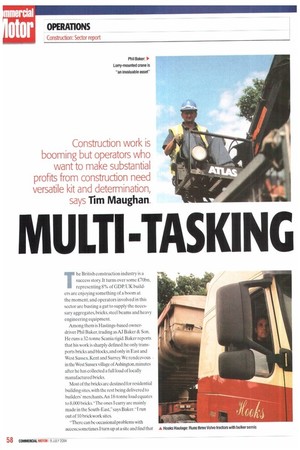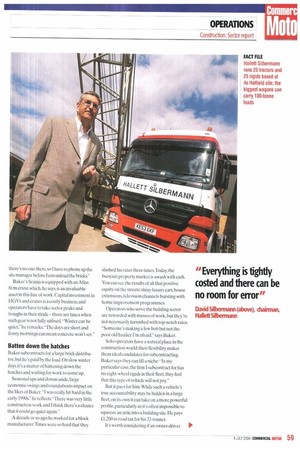MULTI TASK NG
Page 58

Page 59

If you've noticed an error in this article please click here to report it so we can fix it.
The British construction industry is a success story. It turns over some £70bn, representing 8% of GDP. UK builders are enjoying something of a boom at the moment, and operators involved in this sector are busting a gut to supply the necessary aggregates, bricks, steel beams and heavy engineering equipment.
Among them is Hastings-based ownerdriver Phil Baker, trading as A.1 Baker & Son. He runs a 32-tonne Seania rigid. Baker reports that his work is sharply defined: he only transports bricks and blocks, and only in East and West Sussex, Kent and Surrey. We rendezvous in the West Sussex village of Ashington,minutes after he has collected a full load of locally manufactured bricks.
Most of the bricks are destined for residential building sites, with the rest being delivered to builders' merchants.An 18-tonne load equates to 8.000 bricks. "The ones I carry are mainly made in the South-East," says Baker. -I run out of 10 brickwork sites.
"There can be occasional problems with access;sometimes I turn up at a site and find that there's no-one there, so I have to phone up the site manager before Ican unload the bricks."
Baker's Scania is equipped with an Atlas 8t/m crane which,he says, is an invaluable asset in this line of work. Capital investment in HGVs and cranes is a costly business, and operators have to take sector peaks and troughs in their stride there are times when such gear is not fully utilised." Winter can be quiet," he rernarks.-The days are short and frosty mornings can mean concrete won't set.
Batten down the hatches Baker subcontracts for a large brick distributor, but he's paid by the load. On slow winter days it's a matter of battening down the hatches and waiting for work to come up.
Seasonal ups and downs aside, large economic swings and roundabouts impact on the likes of Baker. "I was really hit hard in the early 1990s," he retlects."There was very little construction work and I think there's a chance that it could go quiet again."
A decade or so ago he worked for a block manufacturer.Times were so hard that they slashed his rates three times. Today the buoyant property market is awash with cash. You can see the results of all that positive equity on the streets: shiny luxury cars, house extensions, television channels bursting with home improvement programmes.
Operators who serve the building sector are rewarded with masses of work, but they're not necessarily furnished with top-notch rates. "Someone's making a few bob but not the poor old haulier I'm afraid," says Baker.
Solo operators have a natural place in the construction world their flexibility makes them ideal candidates for subcontracting. Baker says they can fill a niche:-In my particular case, the firm !subcontract for has no eight-wheel rigids in their fleet,they feel that this type of vehicle will not pay."
But it pays for him, While such a vehicle's true accountability may be hidden in a large fleet, on its own it can take on a more powerful profile, particularly as it's often impossible to squeeze an artic into a building site. He pays £1,200 in road tax for his 32-tonner.
It's worth considering if an owner-driver PIO'




























































































































































































